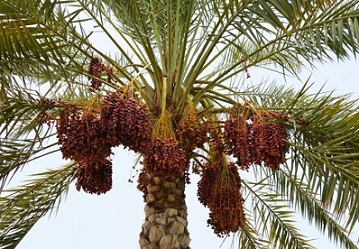Herbs And Phytochemicals: Randomized Clinical Trial Shows That Extracts Of Date Palm Can Treat Cutaneous Warts
Nikhil Prasad Fact checked by:Thailand Medical News Team Apr 25, 2024 1 year, 7 months, 4 weeks, 14 hours, 31 minutes ago
Herbs And Phytochemicals: Cutaneous warts, caused by the human papillomavirus (HPV), pose a significant burden on individuals' quality of life globally. These benign epithelial lesions are common among various demographics, including school-aged children, immunosuppressed individuals, and those in certain occupations like meat handling. The prevalence of HPV infections, particularly the high-risk subtypes linked to intraepithelial lesions and cancer, underscores the importance of effective wart treatments.
 Randomized Clinical Trial Shows That Extracts Of Date Palm
Randomized Clinical Trial Shows That Extracts Of Date Palm
Can Treat Cutaneous Warts
Current treatment options for cutaneous warts range from destructive techniques and immunotherapy to antimitotic drugs. However, these approaches often come with drawbacks such as high costs, low efficacy, adverse effects, and recurrence rates. As a result, there's a pressing need for novel and efficacious therapeutic strategies to address this dermatological concern.
Exploring Complementary and Alternative Medicines (CAMs) as Therapeutic Solutions
In recent years, Complementary and Alternative Medicines (CAMs) have gained traction due to their perceived minimal side effects and potential efficacy in treating various medical conditions. Herbal remedies, in particular, have garnered attention for their diverse bioactive compounds and therapeutic properties. Among these natural sources, Phoenix dactylifera L. (date palm) stands out for its traditional use in folk medicine, especially in regions like North Africa and the Middle East.
The Promise of Phoenix dactylifera L. - Antiviral Effects and Phytochemical Composition
Phoenix dactylifera L. has been studied extensively for its pharmacological properties, including antioxidant, antibacterial, antiviral, antifungal, and antiproliferative effects. These attributes are attributed to its rich content of phenolic compounds such as gallic acid (GA) and tannins. Notably, GA has demonstrated antiviral activity against RNA viruses like parainfluenza-3 and herpes simplex-1. Additionally, tannins from plant extracts have shown efficacy against influenza A virus and HPV, highlighting their potential as antiviral agents.
Pilot Clinical Study: Efficacy and Safety of WartOver®
A pilot clinical
Herbs And Phytochemicals study was conducted to evaluate the efficacy and safety of WartOver®, a topical formulation based on Phoenix dactylifera L. leaf extract, in treating cutaneous warts. The initial study demonstrated promising results, including complete wart clearance in a significant percentage of patients with no adverse effects or recurrence during follow-up.
Randomized Clinical Trial: Methodology and Results
Building upon the pilot study, a randomized, double-blind, placebo-controlled trial was designed to further investigate the efficacy of WartOver®. The trial involved 70 eligible patients divided into intervention and placebo groups.
The key parameters assessed included complete clearance rate, duration of treatment, patient satisfaction using a Likert scale, adverse effects, and recurrence over a 12-week treatment period and a 6-month follow-up.
Clinical Trial Outcomes and Analysis
The results of the randomized clinical trial revealed significant efficacy of WartOver® compared to the placebo, with a complete clearance rate of 68.57% in the intervention group. This was notably higher than the 8.57% clearance rate observed in the placebo group. Moreover, the time to complete clearance was relatively short at 7.6 weeks on average. Patient satisfaction, as measured by the Likert scale, indicated a high level of contentment with the treatment.
Mechanisms of Action and Future Implications
The therapeutic efficacy of WartOver® can be attributed to the antiviral, anti-inflammatory, and antioxidative properties of Phoenix dactylifera L. leaf extract. Compounds like GA and tannins exert antiviral effects by inhibiting viral replication and promoting apoptosis in infected cells. Furthermore, the formulation's ability to modulate proinflammatory pathways contributes to its overall effectiveness in treating cutaneous warts.
Conclusion: WartOver® as a Novel Treatment Option
In conclusion, WartOver® represents a novel and promising treatment for cutaneous warts. Its efficacy, safety profile, and patient satisfaction make it a valuable addition to the therapeutic armamentarium against HPV-related dermatological conditions. However, further research is warranted to explore its applicability in specific populations such as pediatric, pregnant, and lactating individuals, as well as its potential for treating genital warts with tailored formulations. As CAMs continue to gain recognition in healthcare, herbal remedies like WartOver® offer a holistic approach to managing cutaneous warts with minimal adverse effects and high patient acceptance.
The study findings were published in the peer reviewed journal: Dermatologic Therapy (Hindawi).
https://www.hindawi.com/journals/dth/2024/8814508/
For the latest on
Herbs And Phytochemicals, keep on logging to Thailand Medical News.
